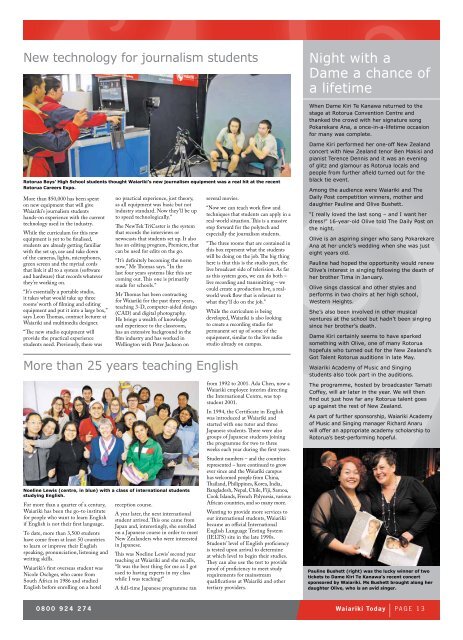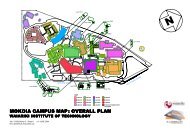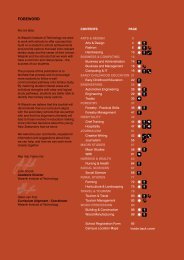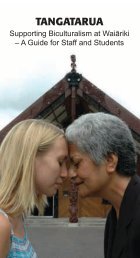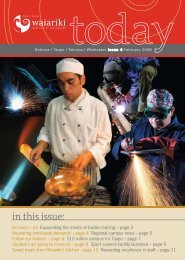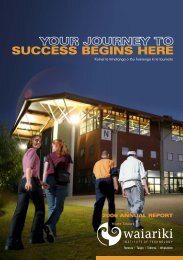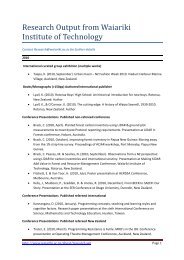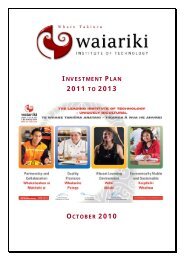Issue 17 • June 2012 - Waiariki Institute of Technology
Issue 17 • June 2012 - Waiariki Institute of Technology
Issue 17 • June 2012 - Waiariki Institute of Technology
You also want an ePaper? Increase the reach of your titles
YUMPU automatically turns print PDFs into web optimized ePapers that Google loves.
New technology for journalism students<br />
Rotorua Boys’ High School students thought <strong>Waiariki</strong>’s new journalism equipment was a real hit at the recent<br />
Rotorua Careers Expo.<br />
More than $50,000 has been spent<br />
on new equipment that will give<br />
<strong>Waiariki</strong>’s journalism students<br />
hands-on experience with the current<br />
technology used in the industry.<br />
While the curriculum for this new<br />
equipment is yet to be finalised,<br />
students are already getting familiar<br />
with the set up, use and take down<br />
<strong>of</strong> the cameras, lights, microphones,<br />
green screen and the myriad cords<br />
that link it all to a system (s<strong>of</strong>tware<br />
and hardware) that records whatever<br />
they’re working on.<br />
“It’s essentially a portable studio,<br />
it takes what would take up three<br />
rooms’ worth <strong>of</strong> filming and editing<br />
equipment and put it into a large box,”<br />
says Leon Thomas, contract lecturer at<br />
<strong>Waiariki</strong> and multimedia designer.<br />
“The new studio equipment will<br />
provide the practical experience<br />
students need. Previously, there was<br />
no practical experience, just theory,<br />
as all equipment was basic but not<br />
industry standard. Now they’ll be up<br />
to speed technologically.”<br />
The NewTek TriCaster is the system<br />
that records the interviews or<br />
newscasts that students set up. It also<br />
has an editing program, Premiere, that<br />
can be used for edits on the go.<br />
“It’s definitely becoming the norm<br />
now,” Mr Thomas says. “In the<br />
last four years systems like this are<br />
coming out. This one is primarily<br />
made for schools.”<br />
Mr Thomas has been contracting<br />
for <strong>Waiariki</strong> for the past three years,<br />
teaching 3-D, computer-aided design<br />
(CAD) and digital photography.<br />
He brings a wealth <strong>of</strong> knowledge<br />
and experience to the classroom,<br />
has an extensive background in the<br />
film industry and has worked in<br />
Wellington with Peter Jackson on<br />
More than 25 years teaching English<br />
Noeline Lewis (centre, in blue) with a class <strong>of</strong> international students<br />
studying English.<br />
For more than a quarter <strong>of</strong> a century,<br />
<strong>Waiariki</strong> has been the go-to institute<br />
for people who want to learn English<br />
if English is not their first language.<br />
To date, more than 3,500 students<br />
have come from at least 50 countries<br />
to learn or improve their English<br />
speaking, pronunciation, listening and<br />
writing skills.<br />
<strong>Waiariki</strong>’s first overseas student was<br />
Nicole Oschger, who came from<br />
South Africa in 1986 and studied<br />
English before enrolling on a hotel<br />
reception course.<br />
A year later, the next international<br />
student arrived. This one came from<br />
Japan and, interestingly, she enrolled<br />
on a Japanese course in order to meet<br />
New Zealanders who were interested<br />
in Japanese.<br />
This was Noeline Lewis’ second year<br />
teaching at <strong>Waiariki</strong> and she recalls,<br />
“It was the best thing for me as I got<br />
used to having experts in my class<br />
while I was teaching!”<br />
A full-time Japanese programme ran<br />
several movies.<br />
“Now we can teach work flow and<br />
techniques that students can apply in a<br />
real-world situation. This is a massive<br />
step forward for the polytech and<br />
especially the journalism students.<br />
“The three rooms that are contained in<br />
this box represent what the students<br />
will be doing on the job. The big thing<br />
here is that this is the studio part, the<br />
live broadcast side <strong>of</strong> television. As far<br />
as this system goes, we can do both –<br />
live recording and transmitting – we<br />
could create a production live, a realworld<br />
work flow that is relevant to<br />
what they’ll do on the job.”<br />
While the curriculum is being<br />
developed, <strong>Waiariki</strong> is also looking<br />
to create a recording studio for<br />
permanent set up <strong>of</strong> some <strong>of</strong> the<br />
equipment, similar to the live radio<br />
studio already on campus.<br />
from 1992 to 2001. Ada Chen, now a<br />
<strong>Waiariki</strong> employee interim directing<br />
the International Centre, was top<br />
student 2001.<br />
In 1994, the Certificate in English<br />
was introduced at <strong>Waiariki</strong> and<br />
started with one tutor and three<br />
Japanese students. There were also<br />
groups <strong>of</strong> Japanese students joining<br />
the programme for two to three<br />
weeks each year during the first years.<br />
Student numbers – and the countries<br />
represented – have continued to grow<br />
ever since and the <strong>Waiariki</strong> campus<br />
has welcomed people from China,<br />
Thailand, Philippines, Korea, India,<br />
Bangladesh, Nepal, Chile, Fiji, Samoa,<br />
Cook Islands, French Polynesia, various<br />
African countries, and so many more.<br />
Wanting to provide more services to<br />
our international students, <strong>Waiariki</strong><br />
became an <strong>of</strong>ficial International<br />
English Language Testing System<br />
(IELTS) site in the late 1990s.<br />
Students’ level <strong>of</strong> English pr<strong>of</strong>iciency<br />
is tested upon arrival to determine<br />
at which level to begin their studies.<br />
They can also use the test to provide<br />
pro<strong>of</strong> <strong>of</strong> pr<strong>of</strong>iciency to meet study<br />
requirements for mainstream<br />
qualifications at <strong>Waiariki</strong> and other<br />
tertiary providers.<br />
Night with a<br />
Dame a chance <strong>of</strong><br />
a lifetime<br />
When Dame Kiri Te Kanawa returned to the<br />
stage at Rotorua Convention Centre and<br />
thanked the crowd with her signature song<br />
Pokarekare Ana, a once-in-a-lifetime occasion<br />
for many was complete.<br />
Dame Kiri performed her one-<strong>of</strong>f New Zealand<br />
concert with New Zealand tenor Ben Makisi and<br />
pianist Terence Dennis and it was an evening<br />
<strong>of</strong> glitz and glamour as Rotorua locals and<br />
people from further afield turned out for the<br />
black tie event.<br />
Among the audience were <strong>Waiariki</strong> and The<br />
Daily Post competition winners, mother and<br />
daughter Pauline and Olive Bushett.<br />
“I really loved the last song – and I want her<br />
dress!” 16-year-old Olive told The Daily Post on<br />
the night.<br />
Olive is an aspiring singer who sang Pokarekare<br />
Ana at her uncle’s wedding when she was just<br />
eight years old.<br />
Pauline had hoped the opportunity would renew<br />
Olive’s interest in singing following the death <strong>of</strong><br />
her brother Tima in January.<br />
Olive sings classical and other styles and<br />
performs in two choirs at her high school,<br />
Western Heights.<br />
She’s also been involved in other musical<br />
ventures at the school but hadn’t been singing<br />
since her brother’s death.<br />
Dame Kiri certainly seems to have sparked<br />
something with Olive, one <strong>of</strong> many Rotorua<br />
hopefuls who turned out for the New Zealand’s<br />
Got Talent Rotorua auditions in late May.<br />
<strong>Waiariki</strong> Academy <strong>of</strong> Music and Singing<br />
students also took part in the auditions.<br />
The programme, hosted by broadcaster Tamati<br />
C<strong>of</strong>fey, will air later in the year. We will then<br />
find out just how far any Rotorua talent goes<br />
up against the rest <strong>of</strong> New Zealand.<br />
As part <strong>of</strong> further sponsorship, <strong>Waiariki</strong> Academy<br />
<strong>of</strong> Music and Singing manager Richard Anaru<br />
will <strong>of</strong>fer an appropriate academy scholarship to<br />
Rotorua’s best-performing hopeful.<br />
Pauline Bushett (right) was the lucky winner <strong>of</strong> two<br />
tickets to Dame Kiri Te Kanawa’s recent concert<br />
sponsored by <strong>Waiariki</strong>. Ms Bushett brought along her<br />
daughter Olive, who is an avid singer.<br />
0800 924 274 <strong>Waiariki</strong> Today |<br />
PAGE 13


